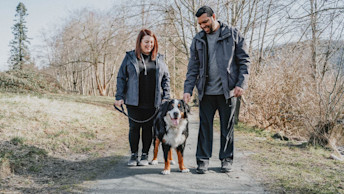November 19, 2021
Adopting a Dog With Behaviour Problems: What to Expect

Did you know that about 72.5 percent of dogs have behaviour problems that are linked to anxiety? Noise sensitivity is one of the most common traits.
Studies completed in Finland and the United States have shown a high level of behaviour problems in dogs of various breeds, ages, and origins. Dogs can have behaviour problems whether adopted from a shelter or not.
However, if you adopt a dog from a shelter, you might be more likely to encounter a few problems along the way.
That doesn't mean that the puppy you have been dreaming of is less worthy. They need a forever home and someone to love them and work through their behavioural problems.
If you're planning to adopt a dog, keep reading to learn about common behaviour problems you may encounter and how to address them.
Reducing Anxiety
Anxiety and separation anxiety are very common behaviour problems in dogs adopted from a shelter. If you are a new dog owner, it can be difficult to know how to respond to anxiety.
However, part of your response should be based on knowledge of what causes the anxiety. The common causes are a lack of structure, stability, and comfort.
Depending on the shelter, your dog was dealing with loud noises, people paying attention to them and then leaving, dogs coming and going, and more.
The length of time they were there could increase the amount of anxiety your dog experiences. How you respond is important because it is going to build your bond with your dog and give your dog the structure, stability, and comfort he or she needs.
Responding to Anxiety
There are many ways that you can respond to anxiety. Part of the process could be as simple as desensitization.
If your dog struggles with separation anxiety, leave for a minute. Then come back and praise your dog. Use kibble pieces as a treat and reward.
As your dog does well with you leaving for a few minutes, keep extending the amount of time. It is important to be patient and not rush the process. This will help your dog learn to recognize that you will come back.
When adopting a dog with anxiety, consider crate training. Crate training will give your dog a cozy den of its own to go to when you are gone. This will allow for comfort as they wait for you to return home.
Other great methods to utilize are distractions such as Kong toys or music therapy. There are specific playlists just for dogs that can help calm anxiety.
Signs of Stress
There are a few types of aggression you may encounter with dogs. These include:
- Territorial aggression
- Fear aggression
- Social aggression
Before you adopt a dog with aggressive behaviours, consider the environment. If you have other children or pets, this may not be the best option. However, if you have the time and ability to care for a dog with aggression, you could have a lifelong friend.
Aggression can be difficult to deal with, and with shelter dogs, it will often come from a place of fear and anxiety. You should consult your vet or look for dog training help when adopting a dog with aggression.
Resource Guarding
Have you ever seen a dog snarling and guarding its dog food when you approach the food bowl? This is called resource guarding.
It is believed that this behaviour comes from losing something important. Your dog may have learned that to keep what belongs to them, they need to guard it.
Dealing with Resource Guarding
If you live in a home with children or other animals, resource guarding can be dangerous if the other animal or child doesn't understand not to approach your new dog in this situation.
You must choose whether to manage this behaviour or find a way to eliminate it. You can manage the behaviour by trading your dog a treat for the guarded object.
However, managing the behaviour is not always the best solution. If you need help with a dog that engages in resource guarding, consult a pet trainer.
Destructive Behaviours
Destructive behaviours, including destructive chewing, can ruin your shoes, couch, and more.
While some chewing is normal, chewing excessively can be a sign of:
- Anxiety
- Stress
- Frustration
- Lack of exercise
- Lack of mental stimulation
Dealing with Destructive Behaviours
When it comes to destructive behaviours, dealing with them comes down to figuring out the reason. If your dog is bored or has excessive energy, find ways to wear them down.
If your dog is anxious, deal with the anxiety using some of the methods we discussed above.
What you should never do is respond by yelling, muzzling, hitting, or crating your dog for long periods of time. This will not solve the problem and in some cases can even make it worse.
Adopt a Dog with Behaviour Problems Today
Dealing with behaviour problems in dogs can be difficult. However, at the end of the day, when you take the time to help your new best friend through their anxiety or fear, it can be very rewarding.
Are you looking to adopt a dog? Make sure you are caring for your dog's mind, body, and soul. Feed them the best food.
Go! Solutions is a pet food brand that your dog will love and you will love for your dog. Shop with us today.



